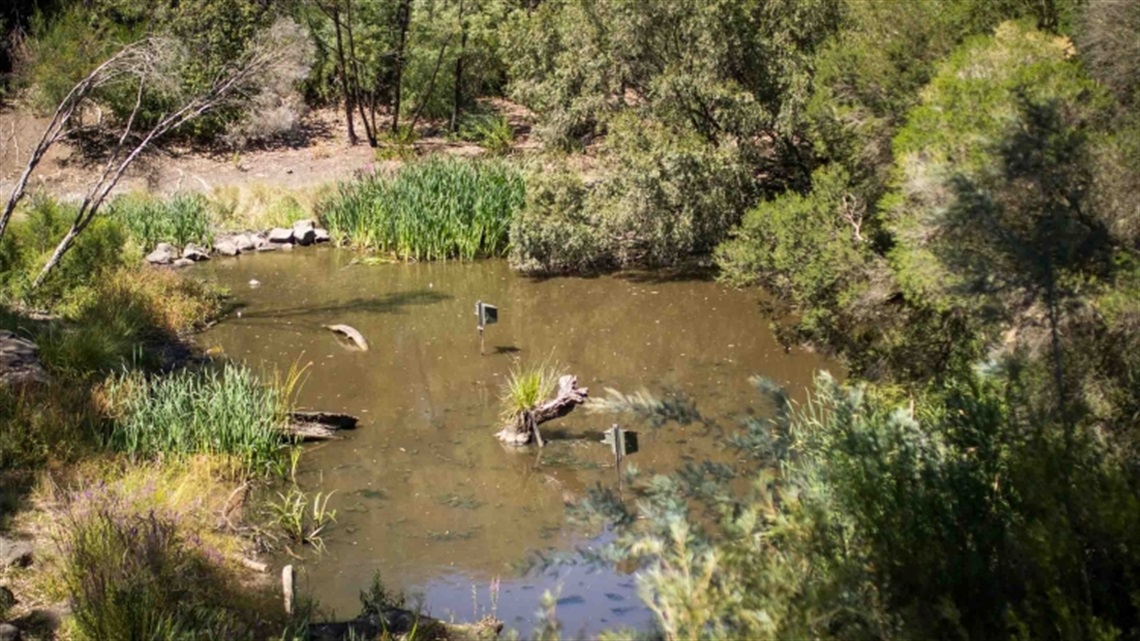Southern Road Wetland

The existing Southern Road Wetland was removed in 2015 as the first step in restoring the wetland. The works involved removing a large amount of soil and pollution from the main pond, and then the construction of a sediment pond to help collect silt entering the wetland from storm water pipes. It is managed by the Banyule Bushland Management Unit in conjunction with the Friends of Darebin Creek. If you are interested in helping out, join the Friends of Darebin Creek.
Wetland processes
Wetlands provide protection between the land and the shorelines of our creeks, estuaries and beaches, keeping waterways safe from siltation and nutrient runoff. They are strategically placed in the catchment area and can decrease the likelihood of flooding.
The wetland collects stormwater run-off from the surrounding area and filters material like phosphorous and nitrates before it runs into Darebin Creek. These things are most commonly found in detergents, dog poo, fertilisers and litter.
Wetlands have detention basins or ponds that slow the water flow so that many natural processes can occur. This occurs because plants naturally take up and lock in the nutrients through their root systems in order to grow. The wetland also naturally helps with sedimentation. As storm water runs into the wetland, it slows down, and this causes the sediment to settle at the bottom of the wetland. This is why wetlands periodically need to be de-silted to remain at their normal functioning capacity.
Flora and fauna
The vegetation community is floodplain riparian woodland. The Banyule Bushland Management Unit, in conjunction with the Friends of Darebin Creek, replant the wetlands with the intention of returning this area back to its pre-European settlement condition, and to create habitat for birds, reptiles and frogs.
Fauna
| Common name |
Scientific name |
|
Australian wood duck
|
Chenonetta jubata
|
|
Bushtail possum
|
Trichosurus vulpecula |
|
Chestnut teal
|
Anas castanea
|
|
Eastern brown snake
|
Pseudonaja textilis |
|
Eastern blue tongue lizard
|
Tiliqua scincoides
|
|
Laughing kookaburra
|
Dacelo novaeguineae
|
|
Little pied cormorant
|
Microcarbo melanoleucos
|
|
Nankeen night heron
|
Nycticorax caledonicus
|
|
Pacific black duck
|
Anas superciliosa
|
|
Rainbow lorikeet
|
Trichoglossus moluccanus
|
|
Sacred kingfisher
|
Todiramphus sanctus
|
|
Sugar glider
|
Petaurus breviceps
|
|
Superb fairy wren
|
Malurus cyaneus
|
|
Tiger snake
|
Notechis scutatus
|
|
White-faced heron
|
Egretta novaehollandiae
|
|
Willie wagtail
|
Rhipidura leucophrys
|
Flora
| Scientific name |
Common name |
|
Acacia verticillata
|
Prickly moses
|
|
Alisma plantago-aquatic
|
Water plantain
|
| Brachyscome multifida
|
Cut-leaf daisy |
|
Chrysocephalum apiculatum
|
Common everlasting
|
|
Clematis microphylla
|
Small-leaved clematis
|
Correa glabra
|
Rock correa |
|
Cycnogeton procerum
|
Water ribbon
|
|
Eucalyptus camaldulensis
|
River red gum
|
|
Goodenia ovata
|
Hop goodenia
|
|
Gynatrix pulchella
|
Hemp bush
|
|
Hardenbergia violacea
|
Purple coral pea
|
|
Lomandra longifolia
|
Spiny-headed mat rush
|
|
Lythrum salicaria
|
Purple loostrife
|
|
Melicytus dentatus
|
Tree violet
|
|
Mentha australis
|
River mint
|
|
Pelargonium australe
|
Austral Stork's Bill
|
|
Philydrum lanuginosum
|
Wooly waterlily
|
|
Solanum aviculare
|
Kangaroo apple
|
Location
Southern Road, Heidelberg West 3095 View Map
-37.742592, 145.035055
Southern Road ,
Heidelberg West 3095
Southern Road ,
Heidelberg West 3095
Southern Road Wetland